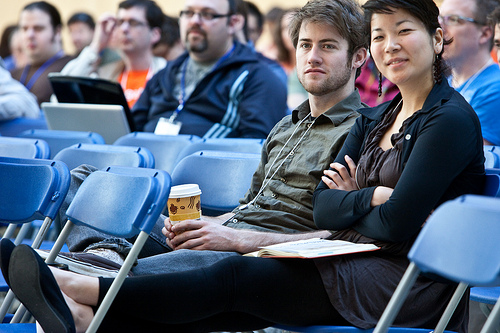How to Use Social Media for Events is a two-part blog series on best practices for event promotion and management using social media tools such as WordPress, Eventbrite, Facebook and Twitter. Part 1 will look at tools to use for organizing and promoting your event. Part 2 will look at ways to use social media during and after the event.
Social media tools are great for organizing and promoting events. Not only can social media tools be used to spread the word, but they can also help you manage ticket sales and registration, as well as event announcements and schedules.
Before the Event
If you don’t have an existing website for posting information about your event, including speaker bios, location, schedule and ticket prices, then you can easily create a blog or wiki for your event.
Blog software, such as WordPress can be downloaded and installed on a server, or WordPress.com can be used to quickly launch an event blog without the hosting fees and server setup. Alternatively, many event organizers use a wiki, like PBworks, to set up their event site. The co-organizers of BookCamp Vancouver have used PBworks for the last 2 years, but it can be cumbersome for new users wishing to add content. In our experience, a quick WordPress.com blog is a better solution if you don’t have the technical expertise to set up your own WordPress blog.
Each of these options lets you add and edit information, organize content such as list speakers and guests, and provide links to the registration page and additional resources.
Use Facebook Events or Eventbrite for Registration
Both Facebook Events and Eventbrite are free tools to use for event registration.
Eventbrite is an events tool that we highly recommend. It has an easy to use interface, allows attendees to register, pay online, print their tickets and share the event with their friends. Organizers can also schedule reminder emails to go out to attendees. In addition, Eventbrite lists popular events by city on their homepage and provides a search for all events available on the site.
Plus, the new Eventbrite for pages app lets organizers embed a ticket sales function directly into their own Facebook Pages.
For more information, check out Eventbrite’s article on how to design a great event page on Eventbrite.
Use Twitter and Facebook to Promote the Event
You can use Twitter and Facebook to promote the event, share news about registration and speakers, and direct people back to the blog, wiki or registration page. A good tactic to generate interest about your event is to post or tweet content from previous events, such as videos, photos or slideshows.
Beyond tweeting content, we suggest creating a unique Twitter hashtag for your event that organizers and attendees can to use in all event-related tweets. A hashtag is useful for identifying the event and it allows people to follow event-related tweets by searching for the hashtag in advanced twitter search and subscribing to the feed.
Attendees and prospective attendees are likely to retweet your event announcement, but it doesn’t hurt to ask for help spreading the word. Encourage your followers to retweet the event if they are interested in attending.
In the next Boxcar Marketing blog post, we will look at how to use social media tools during the event and for keeping in touch following the event. In the meantime, do you have a great marketing or technology event that you want to share? Let us know and we’ll retweet it for you.



